|
|
|
Sort Order |
|
|
|
Items / Page
|
|
|
|
|
|
|
| Srl | Item |
| 1 |
ID:
134170
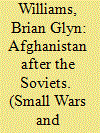

|
|
|
|
|
| Publication |
2014.
|
| Summary/Abstract |
In 1989 the Soviet Union withdrew its forces from Afghanistan leaving the embattled Afghan Communist government of President Mohammad Najibullah to fight against an emboldened mujahideen insurgency. Most experts expected a quick mujahideen victory once the Soviets were no longer directly involved in counterinsurgency operations in support of the Afghan government. But in the spring of 1989 the Afghan Communists beat the odds and defeated a mujahideen rebel offensive designed to capture the eastern city of Jalalabad. This proved to be a turning point, and for the next three years the Najibullah regime held out against the mujahideen 'freedom fighters'. In fact the Afghan Communist regime actually outlasted its sponsor the Soviet Union. The reasons for this remarkable achievement can be traced, in part, to ethnic-tribal divisions among the quarreling mujahideen parties and the Afghan government's ability to exploit them. This largely untold story has obvious implications for understanding the future of post-Karzai Afghanistan, tribalism, ethnicity, and foreign sponsorship in post-US Afghanistan. This article will explore the reasons for the resilience of the Najibullah Communist government and then assess possible implications for a post-2014 Afghan government.
|
|
|
|
|
|
|
|
|
|
|
|
|
|
|
|
| 2 |
ID:
130888
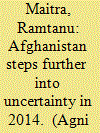

|
|
|
|
|
| Publication |
2014.
|
| Summary/Abstract |
2014 was long anticipated as the year of transition and ushering in of hope for Afghanistan. Three months of this important year are already behind us and, betraying earlier expectations, afghans continue to face stark uncertainties.
|
|
|
|
|
|
|
|
|
|
|
|
|
|
|
|
| 3 |
ID:
131852
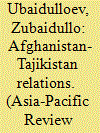

|
|
|
|
|
| Publication |
2014.
|
| Summary/Abstract |
This article attempts to touch upon the relations between Afghanistan and Tajikistan, two neighboring countries, from the historical perspective and the current period. The article analyses the history of Afghanistan-Tajikistan relations during and after the Soviet era, especially during the Afghan Mujahideen's struggle against the Soviet occupational army and Taliban regime in Afghanistan, the Tajikistan civil war of 1992-1997, and after September 11, 2001. In addition, the issues of the ethnic Tajiks in Afghanistan, the violent and vulnerable Tajik-Afghan border, the withdrawal of NATO troops from Afghanistan in 2014 and its impact on Afghanistan-Tajikistan relations, and the new phase of economic relations and an effective cooperation between the both countries are discussed. The article tries to fill the gaps within the body of existing literature and understanding concerning the topic.
|
|
|
|
|
|
|
|
|
|
|
|
|
|
|
|
| 4 |
ID:
128381
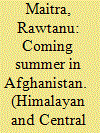

|
|
|
|
|
| Publication |
2011.
|
| Summary/Abstract |
Almonds are not the only ?owers in bloom; the provinces of Kandahar and I-lelmand are awash with opium sap-producing poppies, as well. After two years of steady decline, the United Nations Office of Drugs and Crime (UNODC) predicts a significant growth in opium production in Afghanistan this year. This means one thing, and one thing only: all the international forces - from the offshore bankers to the dollar- a-trip drug mules - who benefit from the multi-billion dollar opiuml heroin business that flourishes under the cover of the ongoing war in Afghanistan are alive and kicking and the insurgents are assured that their financing will remain undisturbed.
|
|
|
|
|
|
|
|
|
|
|
|
|
|
|
|
| 5 |
ID:
127348
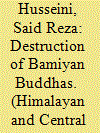

|
|
|
| 6 |
ID:
133166
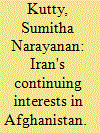

|
|
|
|
|
| Publication |
2014.
|
| Summary/Abstract |
As the year 2014 rolls on and the United States nears completion of its military drawdown in Afghanistan, its neighbors have no choice but to adjust to the quickly changing landscape. One of Afghanistan's most important-but largely understudied-neighbors is Iran. In the years that have passed since 9/11, it is often forgotten that Iran was an early supporter of the ensuing October 2001 invasion of Afghanistan. Tehran had long been wary of the Taliban and the raft of Sunni Islamist extremists it had aided and abetted. Tehran played an extremely constructive role during the Bonn Process, which produced Afghanistan's constitution including the emphasis upon democracy and support for the military invasion, Operation Enduring Freedom.
|
|
|
|
|
|
|
|
|
|
|
|
|
|
|
|
| 7 |
ID:
133165
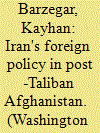

|
|
|
|
|
| Publication |
2014.
|
| Summary/Abstract |
Since the collapse of the Taliban regime in 2001, Iran has followed a two-pronged policy in Afghanistan: first, preserve stability and support the Afghan central government, and second, oppose the presence of foreign forces in the country. For Iran, Afghanistan is the focus point of its "Look to the East" grand strategy-which primarily seeks increased energy and economic relations between Iran and eastern countries in the Asia region, especially India, China, and Japan,1 and is the axis of its goal to establish stability in Southern and Central Asia. That is why, for the past 13 years, Iran has supported so many state-building efforts in post-Taliban Afghanistan.
|
|
|
|
|
|
|
|
|
|
|
|
|
|
|
|
| 8 |
ID:
124836
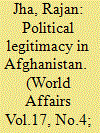

|
|
|
|
|
| Publication |
2013.
|
| Summary/Abstract |
Given the differences between the geographical and socioeconomic basis of the origin of the state in Afghanistan and Europe, it is but obvious that their nature would also differ. The Afghan state directly and indirectly involved various religious institutions, like mosque and Islamic scholars in its day-to-day politics
|
|
|
|
|
|
|
|
|
|
|
|
|
|
|
|
| 9 |
ID:
123372
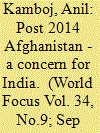

|
|
|
|
|
| Publication |
2013.
|
| Summary/Abstract |
The region of the historical Great Games, the land of Hindu Kush, totters once again, with a grave crises unfolding, portending a bleak future for Afghanistan integrity itself. India has historically enjoyed amicable relations with every government in Kabul with the exception of the Taliban regime. After the ouster of the Taliban regime in 2001, India was one of the first countries to re-open its embassy in Kabul. With its pledge of more than $2 billion since 2002, India is the sixth largest bilateral donor to Afghanistan's reconstruction.
|
|
|
|
|
|
|
|
|
|
|
|
|
|
|
|
| 10 |
ID:
128305
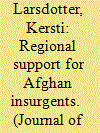

|
|
|
|
|
| Publication |
2014.
|
| Summary/Abstract |
After the fall of the Taliban regime in 2001, several thousand Afghan Taliban forces fled across the border to Pakistan, and the area became a safe haven for Afghan insurgents. In 2014, the transnational dimension of the insurgency is still highly prominent. Although regional support for insurgents is not uncommon, how to counter this aspect is mostly ignored in counterinsurgency (COIN) theory and doctrines. In this article, a regional counterinsurgency framework is developed, using the regional counterinsurgency efforts in Afghanistan as an example. The framework will facilitate the systematic inclusion of regional COIN measures in theory and doctrine.
|
|
|
|
|
|
|
|
|
|
|
|
|
|
|
|
| 11 |
ID:
171593
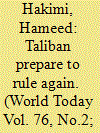

|
|
|
|
|
|
|
|